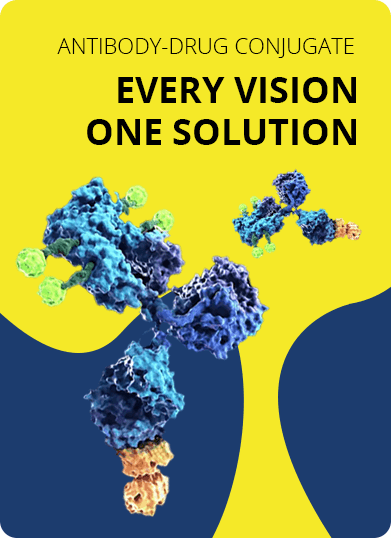- Home
- Applications
- Lung Cancer
ADC Development Services for Lung Cancer Research
Lung cancer is a leading cause of death in both women and men worldwide. Despite remarkable progress in the treatment of lung cancer in the past years, patients with this cancer continue to suffer from poor prognosis and limited treatment options. Hopefully, antibody-drug conjugate (ADC) has emerged as a promising therapy for multiple cancers, and it consists of a monoclonal antibody (mAb) conjugated to a cytotoxic compound via a specific linker, which makes ADC has tumor specificity and powerful tumor-killing effect. Creative Biolabs provides customized ADCs design and production services for various cancer research. Our scientist team has extensive experience in synthetic chemistry and bio-conjugation. We are committed to providing high-quality ADCs to promote your development of innovative treatments for lung cancer.
Introduction of Lung Cancer
Globally, lung cancer has been the most common cancer since 1985, both in terms of incidence and mortality rate. Lung cancer is the largest contributor to new cancer diagnoses (1,350,000 new cases and 12.4% of total new cancer cases) and to death from cancer (1,180,000 deaths and 17.6% of total cancer deaths). The most common symptoms of this disease are cough, dyspnea, hemoptysis, and systemic symptoms, such as anorexia and weight loss. The pathogenesis of lung cancer is extremely complicated, including genetic factors, living environment, and smoking. Although tobacco smoke exposure is a significant risk factor, familial and genetic variations can predispose a person to lung cancer, even nonsmokers. The occurrence of lung cancer is highly related to the regulation of many oncogenes and tumor suppressor genes.
The initial evaluation of a patient with suspected lung cancer begins with a history and physical examination, including complete blood count, measurement of alkaline phosphatase, hepatic transaminase, calcium levels as well as different chemistries. If suspicion remains high, contrast-enhanced computed tomography (CT) should be performed, followed by positron emission tomography when necessary. According to its histologic appearance, lung cancer is classified into non-small cell lung cancer (NSCLC) and small cell lung cancer (SCLC). NSCLC is mainly divided into adenocarcinoma, squamous cell carcinoma, large cell carcinoma and these are further subclassified. NSCLC is sometimes poorly differentiated and only distinguishable by immunohistochemical stains and molecular testing.
Current Therapies and Targeted Treatments for Lung Cancer
Treatment options for lung cancer depend on several factors, including the type and stage of cancer, possible side effects, and the patient's preferences and overall health. There are 5 basic ways to treat lung cancer.
- Surgery
- Radiation therapy
- Chemotherapy
- Targeted therapy
- Anti-angiogenesis therapy
- Epidermal growth factor receptor (EGFR) inhibitors
- Anaplastic lymphoma kinase (ALK) inhibitors
- Anti-angiogenesis therapy
- Anti-tumor antigen monoclonal antibody
- Immunotherapy
Surgery is the most recommended treatment for patients with early-stage lung cancer, such as lobectomy, a wedge resection, segmentectomy, pneumonectomy.
Radiation therapy is the use of high energy X-rays or other particles to destroy cancer cells. Radiation therapy destroys cancer cells directly in the path of the radiation beam and it also damages the healthy cells in its path. For this reason, it cannot be used to treat large areas of the body.
Chemotherapy is the use of drugs to destroy lung cancer cells, usually by keeping these cells from growing and dividing. Chemotherapy may also damage healthy cells in the body and result in many side effects.
Targeted therapy is a treatment that targets the cancer's specific genes, proteins, or the tissue environment that contributes to cancer growth and survival. This type of treatment blocks the growth and spread of cancer cells while limiting damage to healthy cells. It's reported that up to 69% of patients with advanced lung cancer could have a potentially actionable molecular target. Targeted therapy for lung cancer has focused on a series of ligands and receptors that inhibit or stimulate the immunological synapse. Common targeted lung cancer therapies include:
Immunotherapy is designed to boost the body's natural defenses to fight the cancer. For most patients with advanced lung cancer that cannot be treated with a targeted therapy, immunotherapy or immunotherapy plus chemotherapy is often the preferred initial treatment. Drugs like Atezolizumab, Durvalumab, Pembrolizumab all block the PD-1 pathway. However, some immunotherapy may also cause different side effects such as skin reactions, flu-like symptoms, and diarrhea.
ADC Treatment for Lung Cancer
Despite the success of targeted therapies, such as Erlotinib and Bevacizumab in lung cancer, recurrence or progression following initial treatment occurs in the majority of patients. Not every person is eligible for targeted therapies for lung cancer. As one of the fastest growing classes of oncology therapeutics, ADCs offers the potential to deliver highly potent cytotoxic agents to cells expressing a predefined cell surface target in different kinds of lung cancer. The opportunity for improved cancer therapy incorporating ADCs into treatment paradigms shows exciting possibilities for better outcomes for lung cancer patients.
Creative Biolabs has tremendous experience in antibody discovery, ADC design and production. With expertise and dedication, Creative Biolabs will be your best companion in creating customized ADCs or linker-payload complexes to bring your drug development project into the next bright level. If you are interested in our ADC-related services for lung cancer, such as ADC Development for ADC Development for NSCL and ADC Development for SCLC, please don't hesitate to contact us for more information.
For Research Use Only. NOT FOR CLINICAL USE.

Online Inquiry
Welcome! For price inquiries, please feel free to contact us through the form on the left side. We will get back to you as soon as possible.
